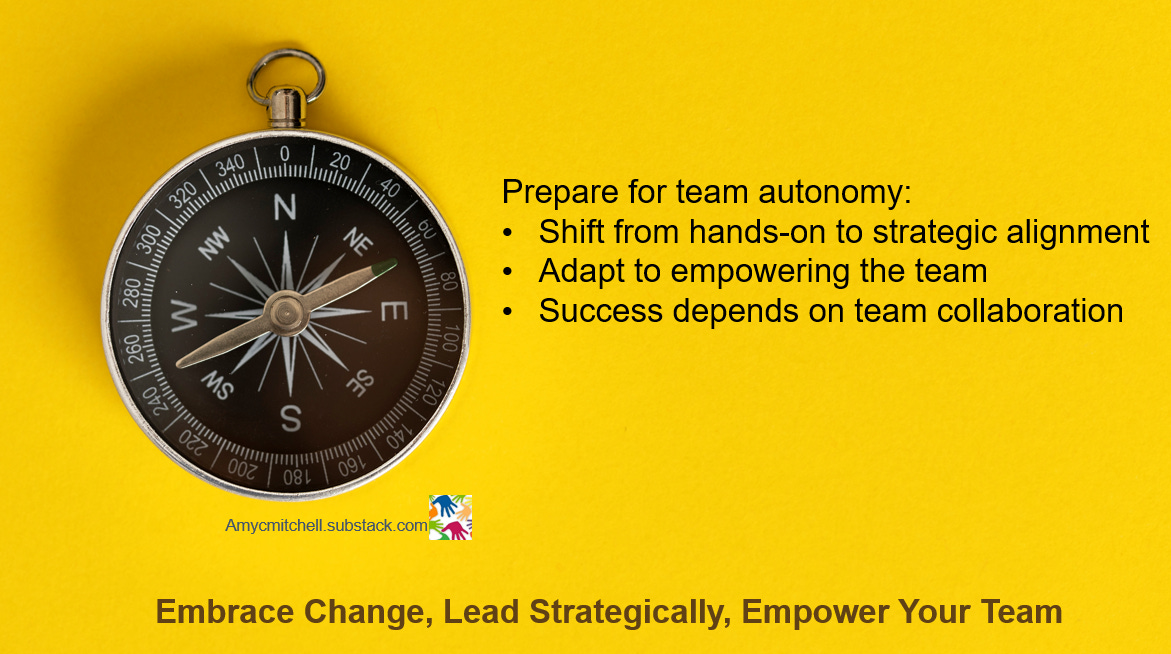Imagine you're leading a team through uncharted territory as the product expert
Only to realize that…
Well, they don't need you
Yes, that was me…
I was the product manager responsible for finding a way to bring the product to market. My days were filled with:
Negotiating crucial external agreements
Securing investments from stakeholders
Fostering cross-function teamwork that bridged gaps between silos
The team came together so well that they turned into a self-sufficient team overnight. My job was done; it was time for me to step aside.
The transition was humbling. Reflecting on it, I was struck by the strength of the team in tackling complex problems. How had I overlooked this strength?
Why This Matters for Product Managers
As a leader in tech, often our strength comes from knowing when to step aside and let the team flourish.
This story isn't just about stepping back; it's about stepping up to a different kind of leadership - empowering and supporting the team.
Let's explore team collaboration and the role of a product manager in creating an environment where teams lead the way.
Common Myths on Team Collaboration
Myth 1: When your team needs your help, it means they always need you to figure out issues
Reality: It means they value your skill and knowledge
It means the team is using your strengths effectively
All the skills together make a strong team.
Myth 2: Team roles are fixed
Reality: Teams evolve to deliver an outcome together
Teams have specialists who take ownership of their areas
Trust and open communications let teams adapt.
Myth 3: Conflict resolution creates losers
Reality: Conflict resolution is about finding a way forward - not finding winners and losers
Stepping aside to let others lead is a strategic decision
Resolving conflicts means you make progress.
Why Do Product Managers Feel Bad about Letting Go?
Stepping aside is a victory for the product team, the organization and the customers. The product team is operating well together and more efficiently. Isn't this a win for the product manager?
Here's why it is hard:
Pressure to be the Driver: Getting the product team to this point took grit and determination. Keeping the team on track and keeping stakeholders happy requires care and constant attention. When the product team is ready to work on their own, a caring product manager misses their contribution to the team.
Fear of Being Redundant: Shifting from owning the decisions to a facilitator role is scary. It is challenging to keep your contribution high in an oversight role. Being attuned to the business value of each team member, you worry that your value as a facilitator is lower.
Valuing Your Contribution: Acknowledging others can lead as well or better than you is humbling. Whether you lead or not, your value is unchanged. Your value shifts to empowering the team to be successful.
Why Is This Happening So Much Now?
With cross-functional teams springing up to handle tough problems in flat organizations, product managers are needed to get the team off the ground. Cross-functional teams no longer need a product manager day-to-day. At the same time, the role of the product manager becomes strategic.
Product teams are becoming autonomous faster than ever:
Access to knowledge, specialists and tools: The whole team has access to AI tools and knowledge bases. There are specialists in UX, data science and finance who step in when needed. When everyone knows the goals and how to find information, then they are less dependent on the product manager.
Product-Led Growth: The product team is empowered to make decisions that support the customer. Experimentation rarely depends on the product manager and results in product innovations. The product manager is needed to align efforts but not directing efforts.
Complex Product Environments: SaaS products, embedded AI, and cloud computing mean no single person has a full depth of knowledge of the product environment. As the complexity increases, team collaboration is essential for product success. In this environment, the product manager's role is coordination and alignment.
Product managers now find themselves in situations where they aren't essential day-to-day. They are still critical to setting a vision and aligning strategy.
Product managers have better outcomes by switching to supportive leadership after the product team is formed.
Summary - Humble yourself and go farther
As AI and complex product architectures redefine our work, the most successful product managers will be those who champion team collaboration and adapt their leadership styles to support and empower their teams. This is not just a phase but a permanent shift in the paradigm of product management.
Prepare to lead differently, think strategically, and act collaboratively. Your ability to adapt today defines your success tomorrow.
TLDR Product Featured Product Management IRL articles this month! This twice-weekly newsletter consolidates product management articles for easy reading.
Last week’s backstory for paid subscribers was about trends in product management. Have the Predictions for Product Managers Changed?
Connect to Amy on LinkedIn, Threads, Instagram and X/Twitter







I've gone through a difficult quarter recently (wrote about it here: https://alexdebecker.substack.com/p/lessons-from-a-tough-quarter-tackling sorry for the shameless plug!) and a lot of what you said resonates. It was really humbling to be kind of... there. Not really helpful. I had to revert back to a 'basic' admin role, checking in on progress, and basically step aside and let them do the hard work.
Tough.
Very helpful I could see as a company grows. Glad I subscribed.